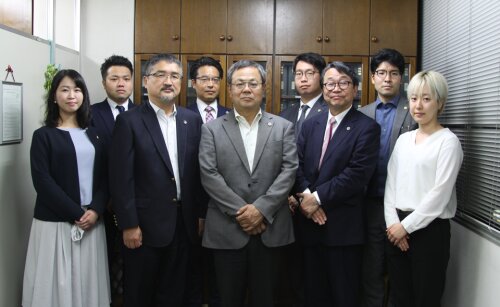Best Employment Benefits & Executive Compensation Lawyers in Shizuoka
Share your needs with us, get contacted by law firms.
Free. Takes 2 min.
List of the best lawyers in Shizuoka, Japan
About Employment Benefits & Executive Compensation Law in Shizuoka, Japan
This guide explains the legal framework and practical considerations for employment benefits and executive compensation in Shizuoka Prefecture, Japan. Employment benefits include statutory items such as social insurance, health insurance, pension, employment insurance, and workplace safety protections. Executive compensation covers pay and benefits for company officers and managers - salary, bonuses, retirement payments, stock-based incentives, and special change-of-control arrangements. Employment law in Japan combines national statutes with local enforcement and practice. While national laws set the rules, local authorities in Shizuoka administer and enforce many provisions, and local custom and company practice shape how benefits and compensation are designed and disputed.
Why You May Need a Lawyer
Employment benefits and executive compensation matters often involve complex legal, tax, and governance issues. You may need a lawyer in Shizuoka if you face any of the following situations:
- Disputes over unpaid wages, unpaid bonuses, or severance payments where your employer refuses to pay or claims no obligation.
- Alleged wrongful or unfair dismissal, including disputes over notice, cause, or procedural fairness for executives and senior staff.
- Negotiations and drafting of executive employment agreements, retention agreements, stock option plans, or change-of-control provisions.
- Enforcement or defense of non-compete, confidentiality, and post-employment restrictions for executives.
- Complex social insurance or pension questions - for example whether directors must be enrolled in employees pension schemes or whether retirement allowances trigger pension or labor standards issues.
- Tax and social insurance compliance tied to bonuses, stock options, deferred compensation, or retirement payments.
- Collective disputes involving unions or works councils, or when multiple employees raise claims that could lead to administrative action.
- Representation before local labor offices, Labour Standards Inspection Office, labour tribunals, or courts when mediation fails.
In many of these situations legal advice protects your rights, helps you understand likely outcomes, and improves your negotiating position.
Local Laws Overview
Employment law in Japan is primarily national law, but local offices in Shizuoka administer and enforce it. The most relevant legal instruments and institutions include:
- Labor Standards Act - Sets minimum standards on working hours, overtime pay, holidays, wages, and statutory severance-related protections. It is enforced by the Labour Standards Inspection Office.
- Labor Contract Act - Governs the formation, interpretation, and termination of employment contracts, including protections against abuse of dismissal and unilateral contract changes.
- Industrial Accident Compensation Insurance Act - Covers employer liability for work-related injuries and illnesses and the process for compensation.
- Social insurance laws - Employees Health Insurance, Employees Pension Insurance, and Employment Insurance are mandatory for eligible workers. Rules determine eligibility, contribution levels, and benefit entitlements.
- Worker Dispatching Act - Regulates temporary staffing and secondment practices that affect benefits and obligations.
- Companies Act and corporate governance rules - For executives and directors, the Companies Act controls procedures for approving director remuneration, stock grants, and director duties. Large or unusual payments may require board resolutions or shareholder approval under the Companies Act and company articles.
- Tax law and social insurance regulations - These affect how bonuses, retirement payments and stock-based incentives are taxed and whether contributions are due. Tax treatment can differ for executives compared with employees.
Local enforcement and advisory bodies in Shizuoka include the Shizuoka Labour Bureau and Labour Standards Inspection Offices, the Shizuoka Prefectural Government labor division, local social insurance and pension offices, and the Shizuoka Bar Association. Administrative procedures - such as filing complaints about unpaid wages or workplace safety - typically start at regional labor offices or Hello Work employment service centers.
Frequently Asked Questions
What statutory benefits must employers provide in Shizuoka?
Employers must enroll eligible employees in social insurance programs - employees health insurance, employees pension insurance, employment insurance, and workers compensation insurance. Employers must also comply with the Labor Standards Act on minimum wages, working hours, overtime pay, paid leave, and workplace safety. Specific local enrollment and reporting steps are handled through local offices and the Japan Pension Service branches in Shizuoka.
Do executives receive the same social insurance coverage as other employees?
Many executives who are also corporate officers are treated as employees for social insurance, but treatment depends on status and employment contract terms. Some high-ranking directors with managerial autonomy may not be enrolled as employees under pension rules. Determination requires a facts-and-circumstances assessment. Consult a specialist to confirm social insurance obligations and contribution responsibilities.
Is there a legal right to severance pay or redundancy compensation in Japan?
There is no general statutory severance requirement under national law, except specific rules for certain public or collective agreements. However, customary practice, company rules, employment contracts, internal regulations, and collective bargaining agreements often create entitlements. Unreasonable dismissal without proper cause or procedures can lead to remedies, including reinstatement or compensation. A lawyer can review your contract and company policies to assess entitlement.
How are executive bonuses and stock options treated for tax and social insurance purposes?
Bonuses are generally taxable as employment income and subject to social insurance contributions when paid. Stock options and other equity-based compensation can have complex tax timing - for example, taxable at grant, exercise, or sale depending on the instrument. Social insurance treatment varies with form and timing. Tax and social insurance advisors should be involved when designing or accepting equity plans.
Can an employer enforce a non-compete clause against an executive in Shizuoka?
Non-compete clauses can be enforceable in Japan if they are reasonable in scope, duration, and geographical area and protect a legitimate business interest. Courts scrutinize restraints that unreasonably limit an individual’s ability to work. Compensation for the restricted period strengthens enforceability. Local courts in Shizuoka consider reasonableness and proportionality when deciding enforcement cases.
What should I do if my employer refuses to pay wages or a promised bonus?
First gather contract documents, pay slips, company rules, and any written communications about the unpaid amounts. Attempt internal resolution through HR if safe. If that fails, you can file a complaint with the Labour Standards Inspection Office or seek mediation through the prefectural labour bureau. For complex or high-value claims, retain a lawyer to demand payment, start civil proceedings, or pursue criminal complaint options when appropriate.
How are retirement allowances for executives calculated and taxed?
Retirement allowances vary widely by company practice and contract. Some companies use formulas based on years of service and final salary, while others negotiate lump-sum exit payments. Tax treatment depends on whether amounts qualify as retirement income and the application of special deductions under Japanese tax law. Pensionable status and social insurance consequences should also be checked. Consult both legal and tax advisors before agreeing to or paying large retirement amounts.
Do I need shareholder approval for director remuneration in Shizuoka companies?
Under the Companies Act, certain types of remuneration for directors require shareholder approval or must be set by the articles of incorporation. Fixed monthly remuneration is typically resolved by shareholders or set by the company’s internal procedures, while performance-based or extraordinary payments often need additional corporate approvals. Corporate governance and company articles guide the required steps.
Where do I file a complaint about workplace harassment or discrimination in Shizuoka?
Harassment and discrimination complaints can be raised with the employer, and many companies have internal consultation processes. If internal measures fail, you can seek help from the Shizuoka Labour Bureau, the Labour Standards Inspection Office, or the prefectural human rights or labor consultation centers. For sexual harassment and workplace power harassment, recent laws strengthen employer duties to prevent and remediate harassment, and administrative remedies or civil claims are available.
How long do I have to bring a claim for unpaid wages or wrongful dismissal?
Statutory limitation periods vary by claim. Claims for unpaid wages are generally subject to a three-year limitation under civil law, but exceptions and tolling rules can apply. For some labor standards administrative complaints or criminal reports, different timelines may apply. Wrongful dismissal claims should be brought promptly to preserve evidence and access mediation. Consult a lawyer quickly to confirm applicable limitation periods for your case.
Additional Resources
For help and further information in Shizuoka, consider these local resources and professional advisors:
- Shizuoka Labour Bureau and local Labour Standards Inspection Office - for enforcement of labor standards and workplace safety.
- Shizuoka Prefectural Government labor or employment division - for local labor policy and support services.
- Hello Work offices in Shizuoka - public employment security offices that provide guidance on employment insurance and job transitions.
- Japan Pension Service - Shizuoka pension office - for questions about Employees Pension Insurance and benefits.
- Shizuoka Bar Association - for referrals to qualified lawyers experienced in employment and corporate law.
- Certified Social Insurance and Labor Consultants (shakai-hoken rishi) - for payroll, social insurance, and employment practice compliance.
- Certified public tax accountants - for tax advice related to compensation, bonuses, stock plans, and retirement payments.
Next Steps
If you need legal assistance in Employment Benefits and Executive Compensation in Shizuoka, follow these steps:
- Gather documents - collect employment contracts, company bylaws or articles, pay slips, bonus agreements, pension statements, termination letters, and any relevant internal rules or communications.
- Identify the issue clearly - unpaid wages, dismissal, benefits dispute, contract drafting, or negotiation of executive terms.
- Seek an initial consultation - contact a local employment lawyer or the Shizuoka Bar Association for a referral. For technical social insurance questions also consult a certified social insurance and labor consultant and a tax advisor.
- Act quickly - many claims have time limits and evidence can disappear. Early legal advice preserves options and strengthens negotiation or litigation strategies.
- Consider alternative dispute resolution - mediation through the labour bureau or voluntary settlement can be faster and less costly than litigation, but you should have legal advice before accepting settlement terms.
- When negotiating executive packages - insist on clear written agreements that cover salary, bonuses, change-of-control provisions, non-compete terms, termination clauses, taxation and social insurance treatment, and dispute resolution mechanisms.
Legal matters involving employment benefits and executive compensation often require coordinated legal, tax, and social insurance advice. Local Shizuoka specialists can help you navigate regional procedures and represent you with local authorities or courts when needed.
Lawzana helps you find the best lawyers and law firms in Shizuoka through a curated and pre-screened list of qualified legal professionals. Our platform offers rankings and detailed profiles of attorneys and law firms, allowing you to compare based on practice areas, including Employment Benefits & Executive Compensation, experience, and client feedback.
Each profile includes a description of the firm's areas of practice, client reviews, team members and partners, year of establishment, spoken languages, office locations, contact information, social media presence, and any published articles or resources. Most firms on our platform speak English and are experienced in both local and international legal matters.
Get a quote from top-rated law firms in Shizuoka, Japan — quickly, securely, and without unnecessary hassle.
Disclaimer:
The information provided on this page is for general informational purposes only and does not constitute legal advice. While we strive to ensure the accuracy and relevance of the content, legal information may change over time, and interpretations of the law can vary. You should always consult with a qualified legal professional for advice specific to your situation.
We disclaim all liability for actions taken or not taken based on the content of this page. If you believe any information is incorrect or outdated, please contact us, and we will review and update it where appropriate.










